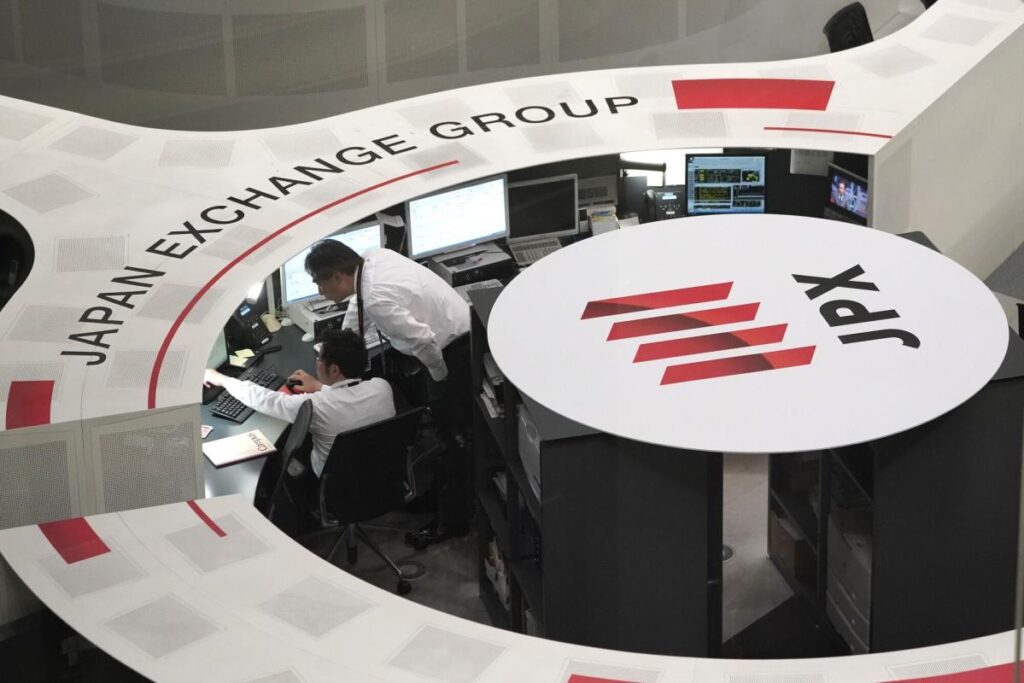(Bloomberg) — US stock futures rose in early Monday trade after a deal was reached over the weekend to avoid a government shutdown. A gauge of Asian equities fluctuated amid concern that global interest rates will stay elevated.
Most Read from Bloomberg
Futures contracts on the S&P 500 climbed 0.5% after the passage of compromise legislation to keep the US government running until Nov. 17. Australia’s benchmark stock index pared a drop. Japanese stocks advanced after the quarterly Tankan survey showed confidence among large manufacturers picked up for a second consecutive quarter.
Moves may be exacerbated by thin liquidity as China markets are shut for a week-long holiday, while South Korea and a number of Australian states are also closed.
Investors found a measure of relief after data over the weekend showed China’s manufacturing activity returned to expansion for the first time in six months, which added to signs that some parts of the economy are finding a footing again. South Korea — one of the world’s largest exporters — also saw the slump in its exports ease further in September.
The dollar was little changed and Treasuries fell.
While markets may gain some early relief from the US deal, attention will quickly shift to Federal Reserve Chief Jerome Powell as he speaks in a discussion later Monday.
US manufacturing activity and jobs data will also be in the spotlight this week after the head of the New York Fed said Friday policymakers should leave interest rates high for some time.
“Financial markets were bracing for a shutdown, so there’s an element of relief, but it’s only a temporary lifting of one of the clouds hanging over the markets now,” said Yung-Yu Ma, chief investment officer at BMO Wealth Management. “Interest rates and Fed hawkishness remain the name of the game and the main driver of the markets over the next few weeks.”
Read More: Once Unthinkable Bond Yields Now the New Normal For Markets
Walk a Fine Line
A mixed opening on the first trading day of October may put a temporary stay on a torrid period for global financial markets. Elevated interest rates made the July-to-September quarter the worst for MSCI’s all-country stock index since September 2022 as surging oil prices added fears over inflation and slowing economic growth. Bonds meanwhile had their biggest monthly selloff in September since February.
While global rates may be close to their peaks, central banks are being hard-pressed to walk a fine line between reining in rising prices and skirting a recession. Fed chief Jerome Powell and his European Central Bank counterpart Christine Lagarde are both due to speak in the coming week and investors will scrutinize any reaction from them following data that suggested inflation has markedly slowed.
“Unless we get a clearly changed message from the key central banks – urgently — these past few weeks’ big market moves are unlikely to be over,” said Erik Nielsen, chief economics advisor at UniCredit Group. “The combination of high yields and zero growth typically raises concerns about financial stability, and while the key financial institutions are stronger today than in the past, it would be foolish to dismiss the rising risk.”
Elsewhere, oil rose on widespread bets that global demand is running ahead of supply.
Key events this week:
-
China has week-long holiday
-
Bank of England policy maker Catherine Mann speaks on monetary policy, Monday
-
Fed Chair Jerome Powell and Philadelphia Fed President Patrick Harker participate in a roundtable discussion, Monday
-
New York Fed President John Williams moderates discussion on climate risk, Monday
-
Cleveland Fed President Loretta Mester speaks on economic outlook, Monday
-
US ISM manufacturing index, Monday
-
Australia rate decision, Tuesday
-
Atlanta Fed President Raphael Bostic speaks on economic outlook and inflation, Tuesday
-
August US JOLTS report, Tuesday
-
Eurozone services and composite PMIs, Wednesday
-
ECB President Christine Lagarde gives welcome address at conference, Wednesday
-
US ISM services index, Wednesday
-
France industrial production, Thursday
-
BOE Deputy Governor Ben Broadbent, Riksbank First Deputy Governor Anna Breman participate at panel discussion, Thursday
-
San Francisco Fed President Mary Daly speaks at the Economic Club of New York, Thursday
-
Germany factory orders, Friday
-
September US nonfarm payrolls, Friday
Some of the main moves in markets:
Stocks
-
S&P 500 futures rose 0.5% as of 9:04 a.m. Tokyo time. The S&P 500 fell 0.3% on Friday
-
Nasdaq 100 futures rose 0.6%. The Nasdaq 100 was little changed
-
Japan’s Topix index rose 0.4%
-
Australia’s S&P/ASX 200 Index fell 0.3%
Currencies
-
The Bloomberg Dollar Spot Index was little changed
-
The euro was little changed at $1.0563
-
The Japanese yen was little changed at 149.47 per dollar
-
The offshore yuan was little changed at 7.3000 per dollar
-
The Australian dollar was little changed at $0.6439
Cryptocurrencies
-
Bitcoin rose 3.2% to $27,980.94
-
Ether rose 3.4% to $1,732.1
Bonds
-
The yield on 10-year Treasuries advanced four basis points to 4.61%
-
Japan’s 10-year yield advanced one basis point to 0.775%
-
Australia’s 10-year yield advanced three basis points to 4.49%
Commodities
This story was produced with the assistance of Bloomberg Automation.
Most Read from Bloomberg Businessweek
©2023 Bloomberg L.P.


